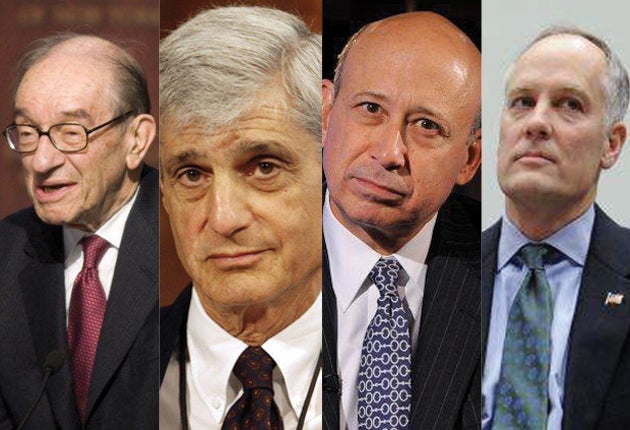Bankers, politicians and the people blamed for credit crisis
Wall Street's recklessness and specific frauds to be detailed today in report on US crash

The financial crisis was an "avoidable" disaster, and the blame for it stretches from the halls of government and the skyscrapers of Wall Street right down to ordinary homebuyers across the US, according to the commission set up to learn the lessons of recent history.
The sheer scale and complexity of the events that engulfed the financial world in 2007 and 2008 defy a single easy explanation, and the Financial Crisis Inquiry Commission (FCIC) will today publish not one but three opinions giving weight to different causes and fingering different culprits.
Commissioners will say that they have passed evidence to the Department of Justice and are recommending prosecutions for fraud in several specific instances, but the broader themes are ones of regulatory failure and Wall Street recklessness, at least according to the leaked extracts emerging this week.
The conclusions of the report are a damning answer to the parade of Wall Street executives who appeared before the commission saying that the financial crisis seemed to come out of a clear blue sky.
"Alarm bells were clanging inside financial institutions, regulatory offices, consumer service organisations, state law enforcement agencies, and corporations throughout America, as well as in neighbourhoods across the country," the authors say. "The greatest tragedy would be to accept the refrain that no one could have seen this coming, and thus nothing could have been done. If we accept this notion, it will happen again."
The events of the unfolding crisis are not in dispute. In 2007, it emerged that the banking system had extended vast amounts of credit to subprime borrowers and that US house prices had become precariously high. Pieces of these subprime mortgages had been bought and sold across the world, so when Americans found themselves unable to pay, they spread a sickness across global finance. Banks, which had themselves borrowed too much money from each other, came close to collapse.
In September 2008, Lehman Brothers toppled, sparking a panic that only the promise of government bailouts in numerous countries stopped. In the US, taxpayers have got their money back from Wall Street now, but the anger remains. The crisis exacerbated a recession and pushed unemployment to almost 10 per cent, and it is resisting all attempts to bring it down. What is much harder is the job of sorting out what factors contributed at each stage, what could have been done differently, and who should have acted.
The FCIC, despite subpoenaing millions of documents from regulators and private firms, and holding weeks of hearings, failed in its task of forging a bipartisan view of the crisis. The divergent opinions, with Republicans on the commission publishing two dissenting reports, will dismay Barack Obama, who set up the commission shortly after becoming President in 2009 and who had hoped its conclusions would galvanise opinion in favour of reform. The makeup of the commission, chaired by Californian Democrat Phil Angelides with a Republican former Congressman, Bill Thomas, as his deputy, was modelled on the bipartisan 9/11 Commission, whose report on the 2001 terrorist attacks on the World Trade Centre went on to become a best-seller.
Extracts of the FCIC's report have appeared this week in The New York Times, The Wall Street Journal and The Washington Post.
Although the main commission report cites greed and management failures at Wall Street firms, it concentrates on wider policy issues. It cites the collapse of mortgage standards in the US as a key cause of the crisis, blaming home owners themselves, fraudulent mortgage brokers and Wall Street's voracious appetite for mortgages to be sliced and diced into derivatives for sale across the world, as well as the Federal Reserve, the US central bank and a powerful regulator. Alan Greenspan, the anti-regulation Fed chairman who was in charge until 2006, is accused in the report of "a pivotal failure" to stop subprime mortgage lending getting out of control.
Mr Greenspan's successor, Ben Bernanke, is criticised for failing to see that subprime mortgage losses would lead to much bigger problems; Wall Street's regulator, the Securities and Exchange Commission, is criticised for letting banks hold a mere $1 for every $40 of lending activity they did, so that even modest losses could wipe them out; the Bush administration is condemned for an inconsistent response to the unfolding crisis.
The schisms in the FCIC reflect wider philosophical debate about the causes of the crisis. The Republican minority said even the sweeping majority report is simplistic as it ignores a credit bubble that went beyond US housing, and indeed beyond US borders.
They also disagreed with the majority's conclusion that US government housing policy and the role of Fannie Mae and Freddie Mac were not major contributors. Fannie and Freddie were government-guaranteed companies that bought or insured mortgages to make them more affordable for low income Americans.
"US government housing policy... led to the creation of 27 million subprime and other risky loans – half of all mortgages in the United States – which were ready to default as soon as the massive 1997-2007 housing bubble began to deflate," the Republican commissioner Peter Wallison writes in another, personal dissenting opinion. "If the US government had not chosen this policy path, the great financial crisis of 2008 would never have occurred."
Subscribe to Independent Premium to bookmark this article
Want to bookmark your favourite articles and stories to read or reference later? Start your Independent Premium subscription today.

Join our commenting forum
Join thought-provoking conversations, follow other Independent readers and see their replies